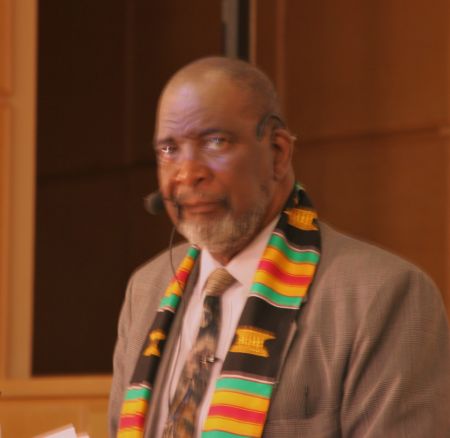The James Robinson Johnston Distinguished Lecture Series was launched Wednesday night at the Schulich School of Law at Dalhousie University by Dr. Afua Cooper, the current James Robinson Johnston Chair in Black Canadian Studies. The series' inaugural speaker was internationally known human rights activist Dr. Burnley “Rocky” Jones.
Born August 26, 1941 in Truro, Nova Scotia, Dr. Jones' career spans the 50 years beginning with the peace and civil rights movements of the 1960’s to today’s continuing struggles against racism and poverty. An activist, lawyer, teacher, parent, and beloved elder in his own community, Dr. Jones is also recognized nationally and internationally for a lifetime of commitment and leadership in human rights, environmental justice, prisoner rights, and the struggle against poverty.
In conversation at the opening reception, Johnston Chair Dr. Afua Cooper noted that lifetime commitment to activism and involvement from local to international levels in the struggle informed her choice of Rocky as premier speaker in the series. Cooper emphasized that Rocky’s unwavering commitment is not only inspirational, but informs a broad vision rooted in experience. She asserted that people like Rocky have an “empowered vision” to share at a time of crisis when we need to “dig deeper into our spirituality” to understand where we’ve been and where we are going. Rocky has a timely vision of how our lives are meant to be, she feels.
Just how timely was illustrated by Jones' opening remarks, in a brief prelude to his planned talk. He addressed the current battle in Halifax between North End community residents and city council over the city’s attempt to sell St. Patrick’s-Alexandra school site to a commercial developer. The situation with the city illustrates “just how far we have not come,” Jones said - we still struggle with racist and classist structures in our society that have a direct impact on our lives and those of our friends, neighbours and allies.
As Dr. Jones reminded us, a history of neglect and brutality has created the perception in the people of the police as an occupying force, and created fear through harassment and intimidation. He encouraged people to overcome any reluctance to speak out in order to protect the community and its right to control its own resources.
Dr.Jones asked the audience to “feel his passion” on the issue. He called for their continued action in support of Rev. Rhonda Britton of Cornwallis Street Baptist Church, who has been leading the fight against city hall on behalf of the Richard Preston Centre for Excellence, North End Community Health Centre, and the MicMac Native Friendship Centre, three longstanding local organizations serving the Central North End of Halifax. The groups have come together to submit a joint proposal for the St. Pat’s-Alexandra site.
Beginning with an acknowledgement of Matthew de Costa in 1605, Jones' talk reached back to the late eighteenth century and the Maroons of 1796, the war of 1812, the rebellions of 1837, and the wars of the 20th century to illustrate the relationship of Black Canadians throughout history to military service, and how their loyalty was betrayed by a racist colonial system. The paternalistic and classist attitudes on which Canada was founded inform the system which oppressed and destroyed Africville, and inform the system which we continue to struggle against today.
Drawing from his personal history, Dr. Jones spoke about the struggle for Black Rights on both sides of the Canada-U.S.A. border in the context of the peace and civil rights struggles and the development of Black Nationalism. He shared anecdotes from the occasion on which he hosted Stokley Carmichael, Kwame Ture and Miriam Makeba for a visit to Nova Scotia. The community space for dialogue and debate, Kwancha House, was remembered, and he described the roots of the Black United Front here in Halifax as well as the founding of the TYP and the Indigenous Black and Mi’kmaq Programs at Dalhousie University.
Regarding today’s struggle, Rocky says that faced with the same entrenched attitudes experienced throughout the Black experience in Canada, we need the kind of intellectual activists who are able to analyze and strategize through formalized discussion to create a true vanguard for effective struggle against a system which is structurally racist and classist.
James Robinson Johnston Chair Dr. Afua Cooper will be a special guest of Wordrhythm Kids workshop happening at 4pm, Feb. 1st at the North Branch Library on Gottingen St.
The James Robinson Johnston Distinguished Lecture Series continues next month, with Isaac Saney on February 15th, 7PM, Room 303 of the Student Union Building speaking on "Race & Revolution: Lessons From Cuba."



